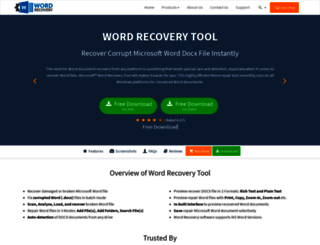MS Word Recovery Tool to Recover & Repair Corrupt MS Word (Docx) Files
Page Load Speed
7.1 sec in total
First Response
175 ms
Resources Loaded
6.5 sec
Page Rendered
424 ms

About Website
Welcome to 2013.wordrecoverytool.com homepage info - get ready to check 2013 Word Recovery Tool best content right away, or after learning these important things about 2013.wordrecoverytool.com
Word recovery tool to recover damaged DOCX files quickly. Word document recovery easily repair corrupted Word file from Microsoft Word 2007, 2010, 2013, 2016, & 2019.
Visit 2013.wordrecoverytool.comKey Findings
We analyzed 2013.wordrecoverytool.com page load time and found that the first response time was 175 ms and then it took 6.9 sec to load all DOM resources and completely render a web page. This is a poor result, as 80% of websites can load faster.